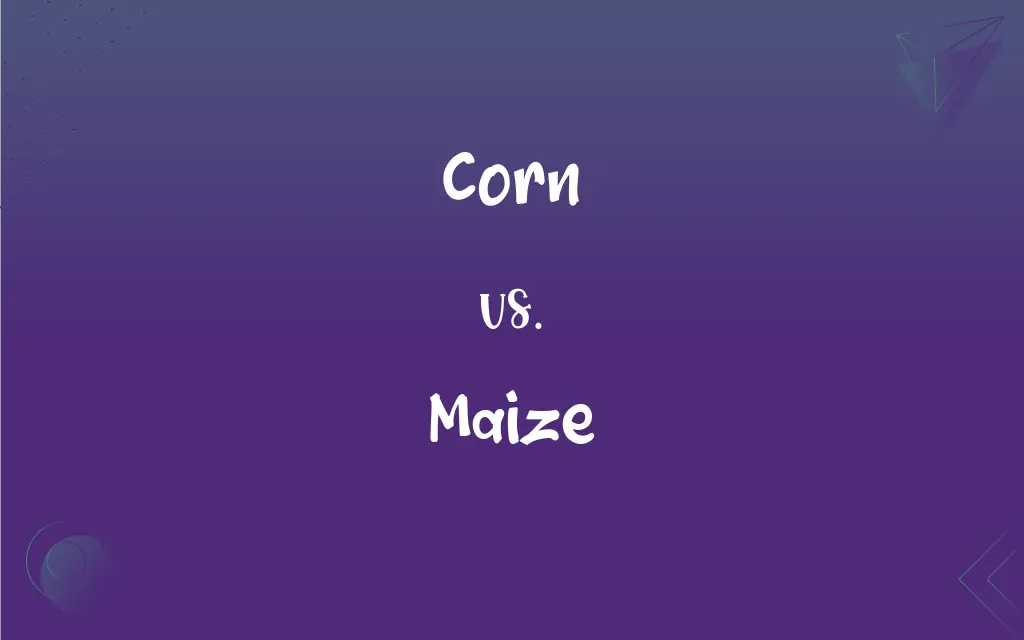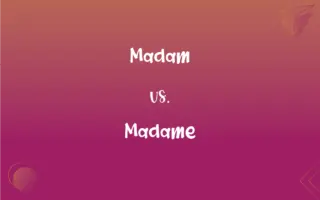Corn vs. Maize: What's the Difference?
Edited by Janet White || By Harlon Moss || Updated on October 2, 2023
Corn and maize essentially refer to the same plant, a staple grain; "corn" is commonly used in the United States, while "maize" is used in scientific contexts and internationally.

Key Differences
"Corn" and "maize" predominantly signify the same cereal grain, Zea mays, which is known for its kernels used worldwide for food and industrial products. Although essentially referring to the identical crop, their usage is distinctively divided by geographical and contextual barriers. In the United States and some other nations, the term "corn" is ubiquitously used in various contexts, from casual conversations to market labeling, making it a staple term in the American vocabulary.
On the other hand, "maize" is widely recognized and used internationally and is often preferred in scientific and formal documents to maintain clarity and consistency. While “corn” could imply different grains depending on the regional dialect, “maize” remains specific to the Zea mays plant. For instance, in the UK, "corn" might generically refer to the principal grain used for food, such as wheat or oats, making "maize" a more explicit term in global contexts.
The etymology of "corn" roots from Old English, symbolizing the most utilized grain of a specific region, whereas "maize" derives from the Spanish form of the indigenous Taino word for the plant. Historically speaking, the term “corn” held a general meaning, referring to the prominent grain in a given area, which elucidates the variability in its implication across various geographical contexts.
Despite the disparity in terms, "corn" and "maize" share an identical biological framework, with varieties that include sweet corn, popcorn, and dent corn. These variations, utilized for distinct purposes such as food, livestock feed, and industrial products, are consistent whether the term "corn" or "maize" is utilized, emphasizing that the distinction lies mainly in terminology rather than substance.
In scientific research and global agricultural discussions, "maize" is typically favored to prevent misinterpretation and to ensure a unified understanding across various countries and languages. Contrastingly, "corn" pervades in American English, signifying not only the crop itself but influencing phrases and idioms, reflecting its historical and cultural significance within the region.
ADVERTISEMENT
Comparison Chart
Common Usage
United States, Canada
UK, International
Context
Informal, general
Scientific, formal
Synonymity
Can mean various grains
Specific to Zea mays
Cultural Implication
Widely recognized
Less culturally rooted
Etymology
Old English
Taino via Spanish
ADVERTISEMENT
Corn and Maize Definitions
Corn
Corn as a verb, particularly in North America, refers to preserving something, usually meat, by sprinkling with salt or sugar.
She decided to corn the beef for several days to create homemade pastrami.
Maize
Maize refers to a cereal plant of the grass family, producing kernels on large ears.
Maize cultivation dates back to ancient civilizations in Mexico.
Corn
Corn may refer to something considered trite, banal, or sentimental.
The movie’s plot was pure corn, but it was entertaining nonetheless.
Maize
Maize, in a historical context, represents a staple crop for several ancient civilizations.
Aztecs used maize not only for food but also as a unit of exchange.
Corn
Corn is a North American cereal plant that yields large kernels on a cob.
Corn is often harvested in the fall.
Maize
Maize also refers to a source from which cornmeal, cornstarch, and corn syrup are derived.
Maize is processed in mills to produce various food ingredients like corn flour.
Corn
Corn can also refer to the leading cereal crop of a district, including oats, wheat, or barley in England.
The farmer rotated planting corn and soybeans each year.
Maize
Maize is used to describe a light, yellowish color, akin to the color of corn kernels.
She chose a soft maize color for the kitchen walls to keep it bright and welcoming.
Corn
In pathology, a corn is a hard, painful area on the skin, especially on the feet, caused by pressure or friction.
He bought special pads to place on his foot to relieve pain from the corn.
Maize
Maize is recognized globally as a crucial crop for both human consumption and livestock feed.
Maize production has been affected by climate change, impacting global food security.
Corn
Any of numerous cultivated forms of a widely grown, usually tall annual cereal grass (Zea mays) bearing grains or kernels on large ears.
Maize
See corn1.
Corn
The grains or kernels of this plant, used as food for humans and livestock or for the extraction of an edible oil or starch. Also called Indian corn, maize.
Maize
A light yellow to moderate orange yellow.
Corn
An ear of this plant.
Maize
Corn; a type of grain of the species Zea mays.
Corn
Chiefly British Any of various cereal plants or grains, especially the principal crop cultivated in a particular region, such as wheat in England or oats in Scotland.
Maize
A large species of American grass of the genus Zea (Zea Mays), widely cultivated as a forage and food plant; Indian corn, commonly called corn. Also, its seed, growing on cobs, and used as food for men and animals.
Corn
A single grain of a cereal plant.
Maize
Tall annual cereal grass bearing kernels on large ears: widely cultivated in America in many varieties; the principal cereal in Mexico and Central and South America since pre-Columbian times
Maize
A strong yellow color
FAQs
Is maize and corn the same?
Yes, maize and corn refer to the same cereal grain but are used differently based on region.
Why is corn called maize outside the US?
"Maize" comes from the Spanish word maíz, derived from the Indigenous Taino word.
Can corn refer to other cereals in different countries?
Yes, in some regions like the UK, "corn" might refer to the primary local grain, like wheat.
What products are made from maize?
Maize is used to produce cornmeal, cornstarch, corn syrup, and biofuels, among others.
What is the primary use of corn/maize?
It's primarily used as food, livestock feed, and as a raw material in industry.
Why is maize important in global agriculture?
Maize is a staple food in numerous countries and crucial for global food security.
Which countries are major producers of corn?
The United States, China, and Brazil are among the top producers of corn.
What part of the maize plant is consumed?
Primarily the kernels, but leaves, and stalks can be used for silage for livestock.
Is maize only yellow?
No, maize comes in various colors, including white, red, purple, and blue.
Can maize be eaten raw?
Yes, sweet corn, a variety of maize, can be eaten raw.
What’s the difference between white and yellow corn?
They are different varieties, with slightly different flavors and nutritional content.
What is baby corn?
Baby corn is regular maize harvested early while the stalks are still small and immature.
Is maize genetically modified?
Some maize is genetically modified for traits like pest resistance or improved nutrients.
How is corn used in the industry?
Corn is used to make bioplastics, ethanol, and other industrial products.
Is maize gluten-free?
Yes, maize is naturally gluten-free.
Are there different varieties of maize/corn?
Yes, including sweet corn, popcorn, flint corn, and dent corn.
How long has maize been cultivated?
Maize has been cultivated for about 10,000 years, originating in Mexico.
Can corn/maize be popped?
Yes, but only specific varieties like popcorn have the ability to pop.
Is corn healthy?
Yes, corn is a good source of fiber, vitamins, and minerals.
How is maize cultivated?
Maize is typically planted in spring and harvested in late summer or early fall.
About Author
Written by
Harlon MossHarlon is a seasoned quality moderator and accomplished content writer for Difference Wiki. An alumnus of the prestigious University of California, he earned his degree in Computer Science. Leveraging his academic background, Harlon brings a meticulous and informed perspective to his work, ensuring content accuracy and excellence.
Edited by
Janet WhiteJanet White has been an esteemed writer and blogger for Difference Wiki. Holding a Master's degree in Science and Medical Journalism from the prestigious Boston University, she has consistently demonstrated her expertise and passion for her field. When she's not immersed in her work, Janet relishes her time exercising, delving into a good book, and cherishing moments with friends and family.































































